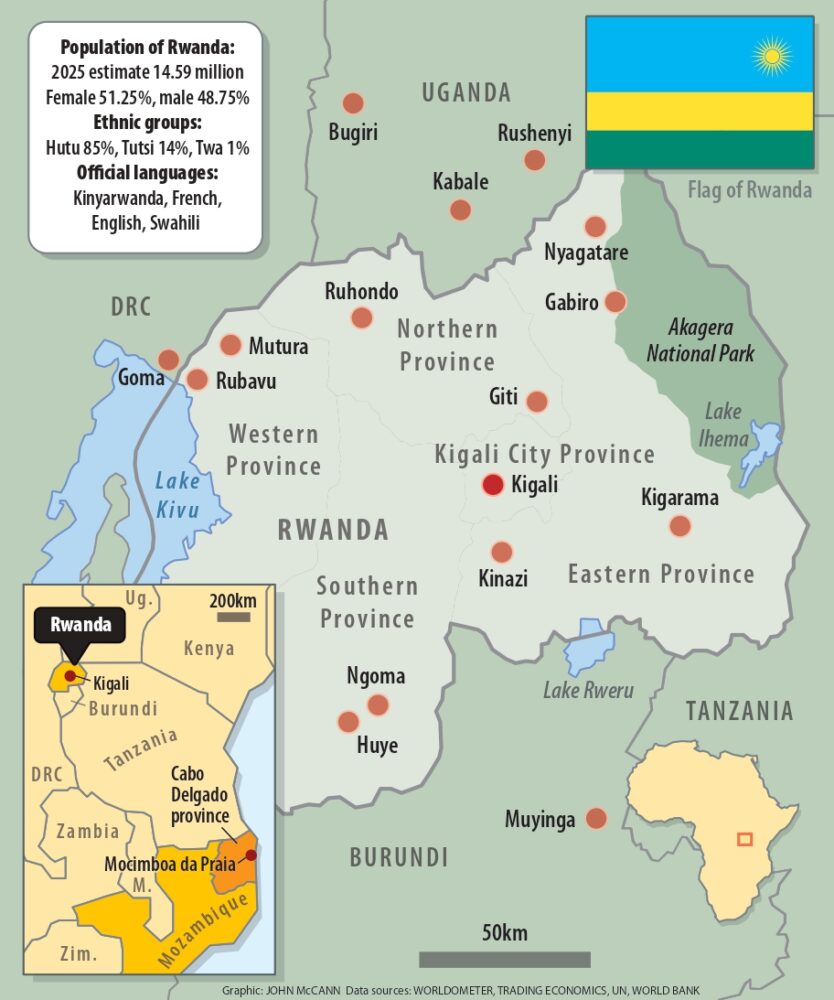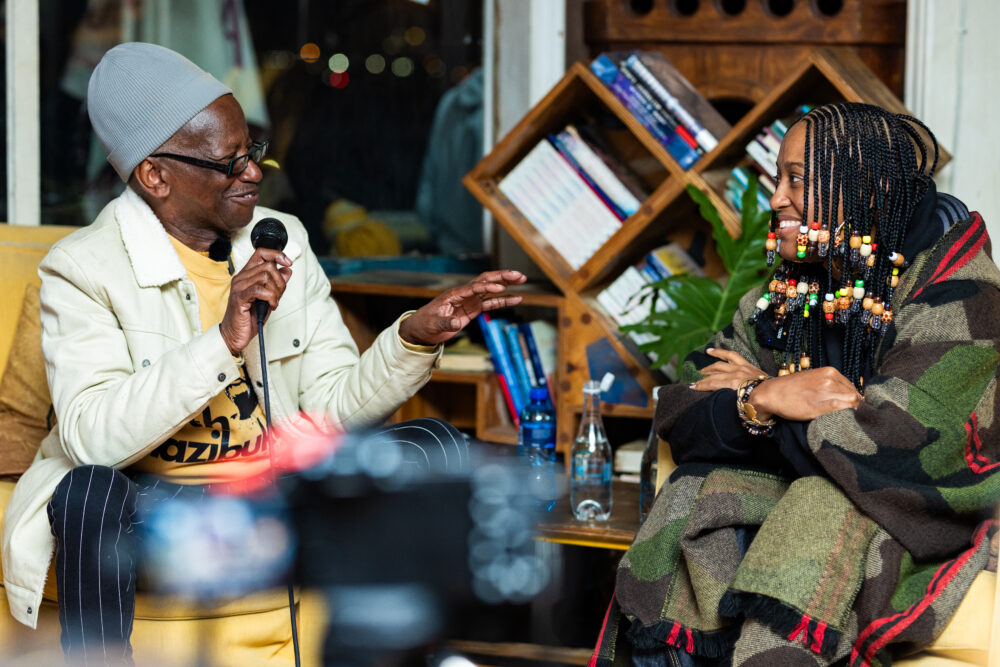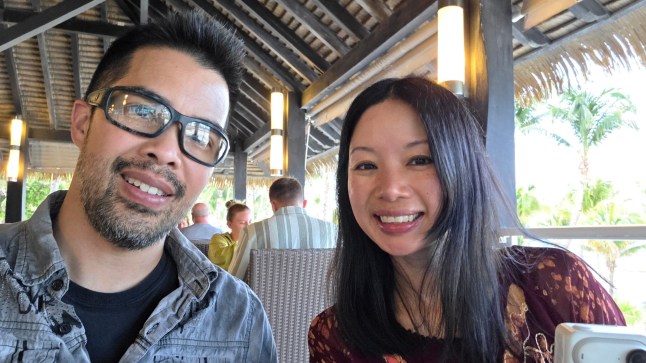28 Jul, 2025 | Admin | No Comments
Lesotho at risk of economic collapse after aid cuts and Trump’s tariffs

Lesotho is facing economic and public health crises triggered by cuts in foreign aid and harsh US trade tariffs. The small, landlocked kingdom is struggling with high unemployment and fresh job losses.
According to an African Development Bank (AfDB) Country Focus Report on Lesotho released last week, the country’s economic growth of 2.4% in 2024 is expected to fall to just 1.1% this year and 0.5% in 2026.
The report says the slowdown is driven by declining Southern African Customs Union revenues, a decrease in foreign aid, and rising trade-related risks (notably the new, prohibitively high US trade tariffs), and the cancellation of the $300-million Millennium Challenge Corporation second five-year compact.
Aid cuts have hit Lesotho’s health sector hard. The sudden termination of US aid programs has resulted in the loss of about 1,500 healthcare jobs, according to the report, and has severely undermined efforts in prevention, treatment, and outreach for HIV. Lesotho has one of the highest HIV prevalence rates globally, with over 20% of the adult population living with the virus.
What makes these cuts even more damaging is Lesotho’s already underfunded health system. The report says Lesotho now has only 21 health workers per 10,000 people, far below the World Health Organisation’s recommended minimum of 44.
At the same time, Lesotho’s key export sector — textiles and apparel — is under threat. The US has imposed a 50% tariff on Lesotho, temporarily reduced to 10% until 1 August. While this reduction offers some relief, AfDB warns that the long-term consequences could be severe.
Lesotho’s textile industry has long depended on duty-free access to US markets, which make up 47% of its shipments, valued at over $200-million annually, and account for nearly 13% of GDP. The AfDB warns that the tariffs could lead to a 20 to 30% decline in orders, a loss of over R1-billion in exports.
“This could push GDP growth below 1%, especially if factory closures or layoffs increase,” the report says. “Lesotho may face further declines in investment, factory relocations, and job losses in its already fragile manufacturing sector, which could reduce tax revenue.”
The AfDB warns of increased rates of poverty, which, together with inequality, are major issues in Lesotho.
Action needed
The report warns that without quick and coordinated policy actions, Lesotho could face a surge in social unrest and poverty.
The AfDB urges Lesotho to act swiftly. Economic diversification, investing in skills and infrastructure, and expanding regional trade, especially through the African Continental Free Trade Area (AfCFTA), are essential.
Tax reform and debt management programmes, supported by AfDB, are already underway. But more action is urgently needed.
To keep the textile sector viable, the report recommends improving quality standards, logistics, and worker skills to meet changing global market demands. It also calls for accelerating regional trade efforts under AfCFTA and encouraging entrepreneurship in non-textile industries.
“Lesotho could reorient its production towards regional markets and gradually reduce its exposure to US policy shocks,” the report suggests.
This article was first published on GroundUp
Amid mounting criticism of United Nations peacekeeping missions and Western military involvement, many African governments have sought alternative security partners — private military companies, local militias and several regional partnerships such as the Alliance of Sahel States and Multinational Joint Task Force around the Lake Chad Basin.
In the eyes of many scholars and practitioners, these partnerships challenge long-standing normative preferences for multilateral and regional institutions, namely the African Union and its regional economic communities.
These institutions have long been lauded for their mandates to preserve the sovereignty of cooperating states and develop collective legitimacy in African governance. In practice, however, consensus-building has frequently led to slow deployment timelines and gross operational inefficiencies on the ground.
While operational successes under multilateral institutions do exist, they are more often exceptions and are vastly outpaced by the decisive responses demanded by Africa’s security crises.
Against this backdrop, Rwanda’s recent forays into bilateral security agreements mark a significant departure from Africa’s status quo.
Kigali’s deployments to the Central African Republic (CAR) in 2020 and Mozambique in 2021 challenge both conventional norms and institutional habits. The relative success of these deployments, especially in contrast with their multilateral equivalents, raises a fundamental question of African security cooperation.
As more states pivot toward bilateral partnerships, is it time to recalibrate Africa’s security architecture? If so, what normative and legal frameworks must accompany this shift to prevent entrenching patterns of dependency and personalised security politics?
Once a recipient of international peacekeeping itself, Rwanda has since become a frequent contributor to peace and security operations in Africa. As a post-genocide state, it carries a unique moral authority on matters of civilian protection. Kigali has sought to amplify this influence through its vocal advocacy for the robust defence of endangered civilians, being one of three countries to co-sponsor a United Nations appeal, known as the Kigali Principles, in 2015.
The country’s foreign policy took a more assertive turn in late 2020, when Kigali dispatched troops to the CAR to counter an insurgent offensive against the capital.
Only a few months later, in mid-2021, Rwandan troops deployed to Mozambique’s Cabo Delgado province. Rwanda was engaged through a bilateral agreement and therefore free to operate outside any pre-existing multilateral mandates or rules of engagement.
From the onset, Rwandan troops were engaged in offensive operations to reclaim insurgent-held territory, including the port town of Mocímboa da Praia. Subsequent campaigns saw Rwandan forces push deeper into Ahlu Sunna Wa Jama (ASWJ) strongholds, including in an eight-day campaign along the Messalo River to capture a key base in Mbau and later joining the Southern African Development Community (SADC) Mission in Mozambique (SAMIM) for a coordinated assault in Macomia.
Despite its emphasis on kinetic, offensive engagements, Rwanda also placed importance on developing a rapport with the local population. This involved taking on various community activities, including static engineering projects and the delivery of healthcare services in remote villages, as well as more dynamic security measures such as accompanying at-risk smallholders to provide protective overwatch while crops were being tilled.
These efforts brought troops into close proximity with local populations, who became vital sources of real-time intelligence on insurgent movements.
Very few, if any, African interventions have simultaneously managed to secure territorial gains, minimise civilian casualties and sustain their engagement with local populations.

In contrast to the operational successes attributed to Rwandan forces, the SAMIM struggled with fragmented command structures, logistical inertia and restrictive rules of engagement. In some instances, troops were confined to their forward operating bases, which severely undermined their effectiveness and all but ruled out any possibility of battlefield gains.
In a move that clearly favoured its bilateral partnership with Rwanda, Mozambique did not establish a joint command structure to enable coordination or intelligence sharing among the various security partners.
Although the agreements themselves are known only to the countries’ top leadership, Rwanda’s commercial interests in the CAR and Mozambique hint at potential motives for its involvement.
Crystal Ventures, the commercial wing of Rwanda’s ruling party, has rapidly expanded its operations in the CAR and Mozambique through its subsidiary companies in recent years. Vogueroc Mining, a firm reportedly backed by Crystal Ventures, received government approval in 2022 to explore mineral licences at five sites in the CAR.
In Mozambique, a joint venture between Rwanda’s Isco Segurança and a local firm won a contract from TotalEnergies to secure $20 billion in LNG infrastructure. Another Crystal Ventures-linked company, Strofinare Mozambique, began exploring graphite deposits near Ancuabe in 2021, a region strategically close to Rwandan operational bases.
This suggests a dual-track strategy that blends security assistance with economic diplomacy, both of which increase Rwanda’s leverage with the external financiers of its deployments. While the European Union and France foot most of the bill, Mozambique pays only a small amount directly to Kigali in exchange for its security services.
The deficit, it seems, is made up with commercial concessions. Rwanda is not the only African state engaging in such dual-track diplomacy, but it is quickly becoming one of the most effective.
While various explanations have been offered for Rwanda’s successes in the CAR and Mozambique, its interventions signify more than just operational efficiency. They coincide with a growing trend among African states to act through bilateral agreements, bypassing the AU and its regional blocs.
This reflects a global shift from multilateralism to ad hoc, interest-driven solutions.
These agreements have advantages but often lack the clear mandates or oversight mechanisms expected of multilateral agreements. Human rights abuses can go unchecked without such rules of engagement and legal accountability, perhaps even more than has happened under multilateral missions.
In Mozambique, the SAMIM forces were credibly accused of burning insurgent remains, although the subsequent investigation is still said to be ongoing.
While multilateral oversight does not guarantee accountability, by sidelining regional frameworks altogether, it is unclear where the burden of oversight resides. This greatly weakens external scrutiny, particularly as missions overrun their original timelines or mandates.
Missions exceeding initial timelines also risk dependency. Mozambique’s reliance on Rwandan troops has grown significantly since 2021, with little sign of a coherent exit strategy or meaningful local security capacity being developed in parallel. When foreign forces play such a central role in stabilisation missions, the host state may come to defer their governance responsibilities rather than develop them.
Rwanda’s role of peacekeeper, counterinsurgent and stabiliser has blurred traditional categories of external intervention in an already neglected province of Mozambique.
At the risk of entrenching a model prioritising stability over sustainability, it needs to be asked whether bilateral agreements are enough to deliver security gains or if local capacity building and governance reform should also be on the agenda.
A reconfiguration of Africa’s security governance, where bilateral deployments and coalitions of the willing are increasingly being perceived as more capable and credible than multilateral interventions, suggests that other capable states may seek to emulate these results, especially when lucrative commercial opportunities form part of the agreement.
Although Rwanda’s successes in Cabo Delgado have garnered a fair amount of attention, its model may not be easily replicable. Few African militaries possess the combination of professionalism, logistical capability and reputational capital that Kigali has cultivated to market itself as a security partner.
Rwanda’s playbook may very well be an outlier and not a trendsetter, although the possibility of other states seeking out similar strategies cannot be ruled out.
As more states consider bilateral partners, Africa could enter an era of hybrid security governance, where formal regional mechanisms coexist with bilateral agreements. These agreements will probably exist between states with capable militaries and receptive host states and carry not only the risk of fragmentation but also of entrenching personalised security politics and dependency.
If hybrid security agreements are to become the new normal, Africa must urgently debate the norms, rules and red lines that will govern their use.
Erika van der Merwe is a research intern with the peace and security programme at Good Governance Africa. She is pursuing a master’s in international relations at the University of Cape Town, specialising in security studies.
Suspended Patriotic Alliance (PA) deputy president Kenny Kunene has resigned from his roles in the City of Johannesburg. His resignation follows his official suspension from the PA pending an investigation into his relationship with murder-accused Katiso “TK” Molefe, who was this week arrested for allegedly orchestrating Oupa Sefoka (DJ Sumbody’s) murder in 2022.
Kunene has agreed to “cooperate with an investigation” and will step aside from his political role in the Patriotic Alliance until he is cleared of the allegations. He will also not act and work in any official capacity in the party while on suspension, its leader Gayton McKenzie said in a statement.
Kunene tendered his resignation as Proportional Representation Councillor and transport MMC in the city of Johannesburg with immediate effect.
“I am stepping aside from public life, for a period, while my party satisfies itself to certain allegations that have been raised against me, which are unfounded, but I have nevertheless agreed it would be in the public interest for me to await the clearing of my name before considering a return to public service and duty,” Kunene said in a statement.
This week, Kunene told the Mail & Guardian that he had done nothing wrong when he was found at Molefe’s premises during his arrest on Monday. He also denied ever meeting Molefe or having any contact with him prior to his arrest.
Kunene, who also owns the online publication African News Global, said the purpose of his visit to Molefe’s property was to facilitate an exclusive interview on various topics for one of his journalists. He added that he only knew Molefe from a distance.
Molefe was arrested for allegedly orchestrating DJ Sumbody’s murder in 2022, and he was also on R100 000 bail for another murder case at the time of his arrest.
The Democratic Alliance, which has been critical of the Patriotic Alliance following these recent revelations, said it notes Kunene’s resignation, but demands investigations into the projects that Kunene was overseeing.
These include a full investigation into all contracts and procurement processes at the Johannesburg Roads Agency (JRA), a full investigation into the contractors and procurement of the Lilian Ngoyi street repairs and a full investigation into contracts, appointments and procurement processes at the Metropolitan Trading Company (MTC).
“Should the executive mayor fail to respond to the DA within seven days, the DA will use all avenues at our disposal, including approaching law enforcement with the information available to us, to hold the executive mayor as shareholder representative himself responsible for the alleged irregularities at JRA and MTC,” the party’s Johannesburg caucus leader Belinda Kayser-Echeozonjoku said in a statement.
This past Friday I walked for nearly 3km through the streets of Jabavu in Soweto from 8pm to 10pm on a winter night in July. That might sound crazy, but it was actually a lot of fun.
I was part of a group of 100 people and along the way we chanted and sang with Karabo Ya Morena, a youth choir from Soweto that were part of our parade. At the front of the crowd, leading us through the streets and keeping the energy up, was Nomsa Mazwai, the originator of Soweto Night Out. At every stop she would yell out “Funk it, I’m walking!” and the crowd would yell back “Let’s walk to freedom!”
What were we thinking, you might ask? Well, partly it was a unique way to celebrate Nelson Mandela Day. But it was also a chance to meet American Grammy award-winning musician and respected emcee Rapsody, who was in the country working on her next album and who joined in on every step of the way.
For most of us, the journey started in Rosebank, where we boarded a bus courtesy of the organisers, which was really appreciated because it muted any worries about transport from Soweto back to town, especially after a long night out.
We arrived at Soweto Theatre where we gathered on the front steps and enjoyed a welcome performance by the youth choir while people clamoured to get their photo opportunities with our illustrious American guest — including yours truly, because there’s nothing wrong with pausing work mode to have a fan moment.
After that we started our walk, accompanied by members of the community policing forum, walking up and down the Jabavu streets with white banners with “Soweto Night Out Tours” written on them at the back and front of the procession.
“What we like to say about ourselves is that we are an alternative protest,” says Mazwai. “When you look at us in the street, we look like a protest, but we’re not. We’re a business. Everybody there is making money. We’re solving the unemployment crisis in South Africa. We’re solving the crime crisis in South Africa. It’s a drop in the ocean. We are not government.
“If we were the government, it would be far greater impact, but we are not. So we are doing what we can, where we can, in the ways that we can do it. And this is just one of the ways that we do it.
“And we are a performance to the community of the possibilities of safety because we’ve shown communities that there is an economic value to safety and we’ve unlocked it for the communities that we work in.”
The origin of these walking tours, which Mazwai now hosts for paid groups of at least 20 people on request, stretches back for more than a decade, when she returned to South Africa after living abroad for years in places such as New York in the United States and Newcastle in the United Kingdom.
“I love walking, and I’ve lived in other parts of the world where I walked everywhere, any time of day, all the time,” says Mazwai.
“And when I came back, I realised I was feeling down because I wasn’t getting to walk.”
So she said, “Fuck it, I’m walking!”
Mazwai even wrote a Facebook post about how she wasn’t going to let anything stop her from walking around as she did when she lived abroad. It was a friend who encouraged her to make the slogan more child-friendly and so she started saying “Funk it, I’m walking!” instead.
At first it was an activist movement that would mobilise walks in support of various causes such as for water with the World Wide Fund for Nature.
But when Mazwai left her job at the Soweto Theatre, where she had spent five years as the general manager, she decided to set her mind to building #FunkItImWalking into a business.
Mazwai put years of research into developing it into a sustainable social enterprise, drawing on her background in economics as a Fulbright alumna with an MA in international political economy and development from Fordham University in the US.
“It took a while but eventually we zeroed in on what our mission or intention was. And it’s that #FunkItImWalking aims to make it safe for a woman to walk at any time of day, in any condition. And how it does that is by thinking about sustainable businesses that enable women’s safety.
“Because I am an activist woman, I have been part of the marches and the seminars where we call the president to come and account. I’ve been part of all of those things and they’ve yielded zero results. The talking has yielded nothing. There’ll be a law that’s passed. Then they say they’re opening centres but the material condition on the ground has not changed.
“And I think for myself, I believe that’s because South Africa decided to be a neoliberal country and it decided to follow that economic policy. That economic policy puts capitalism at its centre. It sees capitalism as the answer. And capitalism puts money above all else. And so it became very clear to me that if I wanted to enjoy safety as a woman, it had to make economic sense,” says Mazwai.
After leaving Soweto Theatre, we first made our way to Kwa-Khaya Lendaba, the late great Credo Mutwa’s cultural village. Once we entered the compound it was so dark we had to use our phone lights to guide our steps. I asked my friend if we weren’t absolutely sure we weren’t being led to a mass sacrifice.

Fortunately, there were no sacrifices, and it turned out to be worth the journey. Once we got to the centre of the compound we sat around the bonfire and listened to Zamalek Giza, a rasta sage, tell us about the life of Credo Mutwa and the fables about creation and the universe.
After that we hit the road again, walking past the notorious Jabulani flats.
“The Jabulani flats are one of the most dangerous parts of Soweto,” says Mazwai. “I’m sure people have read about them a lot in the news. There’s always drama there, but there’s never drama when we do our night tours because our CPOs [community policing officers] are within the community and the community understands the value that we’re bringing into that community.
“Our night walks are incident free to this point. In addition to that, we also work with the Seth Mazibuko Foundation, which is a heritage and youth development-focused foundation. So where we are very focused on women’s safety, they are very focused on youth employment as well as heritage. And so working with Seth, we then started incorporating heritage sites into the routes. Now, because of the way communities have welcomed our work, the museums also came on board and they open at night.”
We made our way to the June 16 Memorial Acre, which opened after hours just for us.
And then finally we walked to Native Rebels, a restaurant and our last stop of the night. It was there where we sat down to watch the main attraction —Rapsody in conversation with the legendary activist Seth Mazibuko.
While some may have initially thought Rapsody would be the one answering questions, it turned out she was interviewing Mazibuko. Their conversation touched on a variety of themes including activism, youth engagement, Pan-Africanism and the future of South Africa.
“I see Rapsody as a voice of the youth,” says Mazwai. “She has built a career that is very conscious, very grounded, and wholesome, and I love that. And so I believed that for Rapsody to level up, she really needs to hear from somebody who changed the trajectory of an entire nation.
“I feel like myself and Rapsody are soldiers on the same battlefield, fighting on the same side, you know, for the lives and the livelihoods of young black people and for black people and brown people all around the world.
“And so when I spoke to her, I said, ‘You know, Rapsody, a lot of young people don’t know Seth Mazibuko, and you don’t know Seth Mazibuko. And so I want you to ask questions that you would ask Seth Mazibuko.
“‘I don’t want to tell you what to ask him, because what I want you to do is to ask him the questions that young people in South Africa are afraid to ask because they don’t want to look stupid.’ I wanted young people to watch their hero not know and be so willing to know and be so fearless in asking because Rapsody has that skill of not being afraid to ask. She wants to know.”
The night ended at about midnight, and I boarded the bus back to Rosebank feeling physically tired but spiritually uplifted and inspired. It was the kind of night that reminded me what’s possible when people come together with purpose, creativity and a little bit of courage.
In a country where safety is too often a privilege, not a right, a night out reminded me that joy, community and economic opportunity can carve out new paths through even the most neglected corners of our cities. Walking through Soweto in the company of song, story and solidarity, I felt like we weren’t just remembering the past. We were actively imagining a better future. And for a few beautiful hours, it felt within reach.
Standard Bank has once again demonstrated its leadership as the best bank in South Africa and Africa after receiving 26 accolades across its continental footprint at the Euromoney Awards for Excellence 2025. At an awards ceremony hosted in London, Standard Bank was recognised for its excellence in corporate & investment banking, customer experience, SME banking and corporate responsibility in 14 markets.
Euromoney evaluates the world’s leading financial institutions through performance data and surveys, and has led a comprehensive awards programme for more than 30 years.
“Our purpose is clear: ‘Africa is our home, we drive her growth.’ As the continent’s leading financial institution, and with Africa poised to remain one of the world’s fastest-growing regions, we are uniquely positioned to capture the immense opportunities ahead while delivering strong returns for our shareholders and positive impact for our clients and the communities we serve,” says Sim Tshabalala, Chief Executive of Standard Bank Group.
Commenting on CIB’s exceptional performance that earned 18 Euromoney awards, Luvuyo Masinda, Chief Executive of Corporate and Investment Banking at Standard Bank said: “Our deep sector expertise, particularly in energy and infrastructure combined with strong client relationships where we offer strategic insight, capital solutions, or trusted advice, has positioned us to lead in landmark transactions. By aligning our lending and global markets capabilities, we were able to deliver market financing solutions tailored to our clients’ needs.
“We aim to sustain and grow this performance by focusing on high growth sectors such as energy, infrastructure, mining and technology media & telecommunications (TMT). We are investing in data and analytics to identify origination opportunities and bring solutions faster to our clients. We are also focused on deepening our competitive advantage in structured capital, expanding our equity capital markets (ECM) and debt capital markets (DCM) solutions beyond South Africa, and investing in the next generation of investment bankers,” Masinda added.
Full list of awards presented to Standard Bank by Euromoney:
Standard Bank Africa’s Best Bank
Standard Bank Africa’s Best Bank for Large Corporates
Standard Bank Africa’s Best Investment Bank
Standard Bank Africa’s Best Investment Bank for ECM
Standard Bank Angola’s Best Investment Bank
Stanbic Bank Botswana’s Best Investment Bank
Stanbic Bank Ghana’s Best Investment Bank
Stanbic Bank Kenya’s Best Investment Bank
Standard Bank Malawi’s Best Bank
Standard Bank Malawi’s Best Investment Bank
Standard Bank Mauritius’s Best Bank for Large Corporates
Standard Bank Mauritius’s Best Investment Bank
Standard Bank Mozambique’s Best Investment Bank
Standard Bank Namibia’s Best Investment Bank
Stanbic IBTC Bank Nigeria’s Best Bank for Securities Services
Stanbic IBTC Bank Nigeria’s Best Bank for SMEs
Standard Bank South Africa’s Best Bank
Standard Bank South Africa’s Best Bank for Large Corporates
Standard Bank South Africa’s Best Investment Bank
Stanbic Bank Tanzania’s Best Bank for Customer Experience
Stanbic Bank Tanzania’s Best Investment Bank
Stanbic Bank Uganda’s Best Bank
Stanbic Bank Uganda’s Best Investment Bank
Stanbic Bank Zambia’s Best Bank for Corporate Responsibility
Stanbic Bank Zambia’s Best Bank for Customer Experience
Stanbic Bank Zambia’s Best Investment Bank
The government’s flagship economic reform programme, Operation Vulindlela, has registered modest progress in the second phase of its roll-out — particularly in visa reform — but faces mounting criticism for delays in key infrastructure areas and a lack of transparency in outcomes and expenditure.
The latest progress report notes that more than 11 000 visas were processed in the first three months under the Trusted Tour Operator Scheme, launched in February. In March, the government accredited qualifying employers under the Trusted Employer Scheme to support the recruitment of foreign skilled workers.
These visa reforms aim to “attract skills, investment and tourism through a streamlined and modernised visa system”. The home affairs department has also upgraded its digital verification system to enable remote authentication and reduce downtime — a step toward building a digital identity system.
Yet the gains made in visa systems are in contrast to widespread delays in fixing constraints in water and sanitation, electricity and freight logistics. Most work so far has been legislative, with little tangible implementation.
Operation Vulindlela, initiated during President Cyril Ramaphosa’s first term, aims to boost economic growth through structural reform. Ramaphosa has touted the operation as a key achievement, and in his latest newsletter called the halting of load-shedding a crucial win in the battle “to remove the binding constraints that have long held back our economy’s growth”.
“The reduction in load-shedding over the past year was supported by the reforms we introduced to unlock private investment in electricity generation, while reforms in the telecommunications sector have brought down the cost of mobile data,” he wrote.
Launched in May after cabinet approval, phase two expands the reform scope to seven areas: electricity, freight logistics, water, visas, local government, spatial inequality and digital transformation.
But despite policy work being under way in several areas — with the Electricity Regulation Amendment Bill, the Water Action Plan, the Digital Transformation Roadmap and the Local Government White Paper among the documents drafted — implementation remains limited. The progress report itself concedes that of the seven priority areas in phase two, only visa reform has moved into tangible outcomes.
The electricity sector reform includes the establishment of the National Transmission Company of SA, which will eventually separate power utility Eskom’s grid from generation and distribution. The government has also finalised a national wheeling framework to enable third-party access to the grid.
Yet, the new transmission company still awaits licensing as a market operator. The National Energy Regulator of SA is also finalising market codes for private wholesale.
Legal adviser and social activist Nkanyiso Ngqulunga was scathing in his assessment, saying Operation Vulindlela represents an acceleration of neoliberal policies that are proving counterproductive.
“It has been a complete failure. The unbundling of Eskom has not yielded any positive results but rather put the country’s energy generation into the private sector,” Ngqulunga said, adding that the reforms have not attracted the promised investment.
“It hasn’t attracted investment as intended. We are implementing policies that have been proven to fail — allowing the private sector in with the hope that it will boost the economy is counterintuitive.”
Ngqulunga believes the government should focus on building state capacity and investing in public infrastructure.
“We need to unlock opportunities by empowering public assets,” he said. “At a time when the government is underperforming, geopolitical tensions are high and tariff wars are growing, it’s misguided to think these reforms will attract investment.”
In logistics, a new Transnet Rail Infrastructure Manager division has been created to modernise operations and enable private operator access. In December, the rail, port and pipeline parastatal released network access tariffs and received 98 slot applications from private freight operators. Conditional awards will be announced by 15 August.
Ntokozo Buthelezi, an economist and researcher, is concerned about the Vulindlela initiative’s accountability.
“I remember from the budget speech, the minister mentioned phase two and I wondered what happened to phase one,” she said, adding that she found it to be “vague” with regard to outcomes and money spent. “We don’t know what happened, how much was spent and what the outcomes were. There is so much secrecy — we have no clue as the public on how investment and loans are spent by the government,” she said, also criticising the absence of oversight.
“They don’t tell us much. It’s just numbers — billions here, billions there — but no tangible outcomes.”
25 Jul, 2025 | Admin | No Comments
Southern Africa through the South African Medical Research Council marks a decade of malaria research and collaboration

As Southern Africa works toward the World Health Organization’s goal of eliminating malaria by 2030, the region continues to face major challenges, including cross-border transmission, limited resources, and insecticide resistance. However, amid these difficulties, a significant milestone will be celebrated this month: the 10th annual Southern Africa Malaria Research Conference.
The event, hosted by the South African Medical Research Council’s (SAMRC) Malaria Research Group (MRG), will take place from July 29 to 31 at the University of Pretoria’s Future Africa Campus. It will bring together scientists, health professionals, policymakers, and regional partners to share insights, showcase progress, and refine strategies to eliminate the disease.
The theme for this year’s conference is “Shaping the agenda to meet the malaria elimination end goal”. This agenda highlights the region’s commitment to aligning research and policy to combat malaria more effectively.
For a decade, the MRG has played a pivotal role in South Africa’s malaria elimination efforts. It is the only organisation to have hosted a dedicated malaria conference annually for ten consecutive years, a testament to its leadership and unwavering commitment to ending malaria in the region. Through its work, the group continues to support the National Department of Health by improving existing interventions, conducting advanced research, and training a new generation of malaria-focused scientists.
Among its notable efforts is its support for the Lubombo Spatial Development Initiative. This project monitors cross-border malaria and insecticide resistance in Limpopo, Mpumalanga, and KwaZulu-Natal. Findings from the initiative have informed national vector control policy and confirmed that local mosquitoes remain susceptible to current insecticides.
The MRG has also been instrumental in cross-border initiatives. In collaboration with the National Treasury, it supported indoor residual spraying in southern Mozambique to reduce the importation of malaria into KwaZulu-Natal. Border screenings and interventions led to a marked decline in imported cases, a clear indication of the power of regional cooperation.
The upcoming conference is expected to provide a platform for the latest developments in parasite biology, surveillance technologies, and vector control. It will also spotlight innovative tools for malaria elimination and successful case studies of cross-border collaboration. As the region intensifies its push toward a malaria-free future, the SAMRC Malaria Research Group’s decade-long dedication continues to inspire a unified, evidence-driven approach to tackling one of the region’s most persistent public health threats.
25 Jul, 2025 | Admin | No Comments
ExpertOption: Africa’s trusted platform for confident, flexible online trading

Online trading is accelerating across Africa, opening up new opportunities for people to grow their income, diversify investments, and gain access to the global financial system. Leading this transformation is ExpertOption — a powerful trading platform built with transparency, flexibility, and ease of use at its core.
Whether you’re completely new to trading or have years of experience, ExpertOption is designed to support your journey every step of the way.
What Is ExpertOption?
ExpertOption is a multi-asset trading platform that lets you buy and sell across a wide range of markets — including stocks, commodities, currencies, ETFs, and indices. It provides real-time data, a smooth user interface, and flexible tools so you can make informed trading decisions anytime, anywhere.
Features That Empower African Traders
- Adaptable Trade Durations and Easy Deal Cancellation
Choose trade durations that match your strategy — whether it’s short bursts based on quick market moves or longer-term positions. If conditions change, ExpertOption allows you to cancel your deal within seconds, helping you manage risk more effectively. - Diverse Asset Options
With the new stock trading mode, you can follow the performance of major companies like Apple, Tesla, or Netflix — and trade on real-time movements. The platform also includes popular currency pairs, energy commodities like oil and gold, global ETFs, and indices. - Advanced Market Analysis Tools
ExpertOption has doubled the number of technical indicators available. On top of staples like RSI and Bollinger Bands, you can now access tools like Aroon, Williams %R, and Stochastic RSI to enhance your market analysis and trade setups. - Device Flexibility and Smooth Access
Trade on your terms — on your smartphone, tablet, or desktop. The platform syncs seamlessly across devices and provides a fast, secure, and stable trading environment wherever you are. - Improved Payment Systems
With a wide range of trusted payment methods, including Visa, Mastercard, bank transfers, mobile money, and digital wallets, deposits and withdrawals are fast and reliable — tailored to the payment habits of African users. - Learn While You Trade
ExpertOption supports your growth with free tutorials, a demo account, and social trading features. Copy successful traders in real time, observe their strategies, and apply your learnings — all while practicing without risking real money. - Earn Rewards with Achievements
The platform includes a dynamic achievement system that rewards your trading progress. Earn perks like risk-free trades and mystery boxes as you unlock new milestones — a gamified approach that makes trading more engaging. - Multiple Account Tiers
Upgrade your experience with tiered account levels, from Basic to Exclusive. Higher tiers offer increased benefits, including faster withdrawals, higher payout potential, and personal account management.
Security, Transparency, and Trust
ExpertOption takes your privacy and financial security seriously. It uses advanced SSL encryption and complies with global safety standards. Unlike many platforms that hide key trade details, ExpertOption makes costs, payouts, and market data completely transparent before each trade — giving you full control over your decisions.
Why More Africans Are Choosing ExpertOption
As more individuals across Africa explore digital finance, ExpertOption is becoming a go-to solution for those seeking financial independence, investment access, and greater economic freedom. Its localized approach, simple interface, and strong reputation are helping it stand out as a top choice in a growing market.
Whether you’re exploring new ways to build wealth or simply learning the ropes of online trading, ExpertOption gives you everything you need — from powerful tools to educational support. Its mobile-first, transparent design makes it one of the most accessible platforms available today.
For Africans eager to take control of their finances, learn new skills, and connect with global markets — ExpertOption offers a smarter, more empowering path forward.
Start trading your way — and take your future into your own hands with ExpertOption.
24 Jul, 2025 | Admin | No Comments
Best summer holiday money-saving deals, from free kids meals to discount days out


Summer is well and truly underway, leaving many parents wondering how they’ll keep the kids entertained on their already-stretched budgets.
No matter how frugal you are, extra spending adds up quickly over the school holidays. From meals to activities, the break can put a serious dent in your wallet.
But there’s no need to panic. A number of UK businesses are offering discounts and deals to help families save money without cutting back on fun — and we’ve rounded up some of the best.
So whether you’re looking to plan a full weekend of adventure, or just trying to keep lunch costs down, this go-to guide has an array of options to ensure your summertime schedule doesn’t break the bank.
Free kids meals
One of the simplest ways to save money this summer is to cut back on dining out. However, many places have promotions over the holidays, so you don’t necessarily have to miss out.
Bill’s
From July 21 to August 29 (excluding weekends), up to two children can eat free when one adult orders any main dish at Bill’s.
The offer runs all day, including the chain’s breakfast, lunch and dinner menus, applying to all children under 10. You’ll also be provided with story books, colouring in materials and stickers to keep the little ones entertained while you dine.
Browse the Bill’s menu and find your local branch here.
Prezzo
With the purchase of an adults main meal, children up to 12 years old will receive a free three-course kids meal at Prezzo, every day from July 14 to September 5.
All you need to do is sign up to receive a code via email, which you then show to the waiter at the end of your meal.
Prezzo has 180 branches across the UK. Visit the website for more information.
Save cash with Kids Pass
For a limited time, you can get a 30-day trial of the Kids Pass discount scheme for just £1, which gives you access to great discounts on activities, restaurants and events all across the UK.
Take a look here for more information.
Ask Italian
Parents who sign up to Ask Italian’s Perks rewards app can save this summer. All you need to do is claim a code, and you’ll get your hands on two free kids meals with the purchase of an adult meal.
Valid from Friday July 18 through to Sunday August 31, it makes for a budget-friendly holiday treat.
For more information on the offer, or to find your nearest branch, check the Ask Italian website.

Bread Street Kitchen by Gordon Ramsay
Finding yourself in London or Edinburgh this summer? Head to Bread Street Kitchen, where children aged 10 and under eat free when accompanied by an adult ordering two courses from the a la carte menu. Kids can choose from mac and cheese, sausage and mash, meatball pasta and more, with no extra cost added to your bill.
This deal is valid every day at its Liverpool, Stratford, Limehouse, Southwark, and St Paul’s locations, or at the City, Heddon Street Kitchen, Battersea, Mayfair and Edinburgh branches on weekdays only.
Visit the Bread Street Kitchen website for more information.
Pizza Express
If your little ones are pizza and pasta fans, you can get a free, three-course piccolo meal at Pizza Express this summer with every adult main. And given these dishes start at just £12.25, it’s a major bargain.
There are 339 Pizza Express restaurants across the UK. For more information on the offer or to find your local branch, take a look here.
Heathrow Airport
Travelling with the whole clan? During the school holidays, Heathrow Airport is running a Kids Eat Free promotion across a variety of its restaurants.
With options in Terminals 2, 3, 4 and 5 – including Leon, Shan Shui, Giraffe and Co-Pilots Bar & Kitchen – it’s a handy way avoid blowing too much holiday cash before you’ve even stepped on the plane.
The promotion is valid from July 18 to September 2, with one free children’s meal for each purchased from the adult’s menu priced at £14.95 or more.
Visit the Heathrow website for more information.
Angus Steakhouse
This popular London spot is offering children aged 8 and under a complimentary kids meal with the purchase of any main menu dish, alongside an activity sheet and crayons to keep young diners occupied.
Available everyday from 12pm to 5pm, across Angus Steakhouse’s five London locations: Leicester Square, Piccadilly Circus, Mayfair, Paddington and Oxford Circus.
You can find more information on the brand’s website.
Extra tips to save on food
Alongside restaurant deals, Metro money expert Rosie Murray-West has a few other tips to make eating out more economical.
Buying a pack of ice creams from the supermarket rather than a van at the beach will save you more than you’d think, especially if you have more than one child.
Or, if you need a caffeine hit while looking after the kids and happen to have a smart meter with Octopus Energy, you can get a code each week for a free tea or coffee at Caffe Nero or Greggs.
Discount days out
Days out can add up fast, but summer adventures don’t mean you have to spend a fortune. Take a look at our shortlist of the some of the best deals over the summer break.
SRO Audiences
If you’re a live entertainment lover but aren’t keen on ticket prices, SRO Audiences has got you covered. This service offers free tickets to a plethora of different TV shows — all you have to do is be an audience member.
With tickets to the likes of Loose Women, Would I Lie to You?, The Voice UK, the Graham Norton Show and 8 out of 10 Cats does Countdown, there’s bound to be something you fancy.
It’s completely free to sign up, and once you have an account you can apply for tickets to all of these popular shows, and more.
Visit the SRO website to see the full list and apply for your seat.

Pets at Home
Begging your kids to take a break from the screen?
Head to Pets at Home, which is hosting free My Pet Pals workshops across its UK stores between July 19 and August 21.
These events – recommended for ages four and above – are designed to teach children about how to take care of a range of animals, with activities, a chance to meet store pets, a pocketbook with collectable stickers, and a My Pet Pals certificate.
Check out the Pets at Home website for more information and to book your spot.
Kew Gardens
Visitors to the stunning Royal Botanic Gardens in Kew, Richmond, can claim two-for-one tickets with National Rail this summer.
As well as being London’s largest Unesco World heritage site and home to the largest collection of living plants on earth, Kew features a range of family-friendly activities, from a treetop walkway to a dedicated children’s garden. Better still, kids under four go free.
Check out full details and claim the offer here.

LEGO
As well as a range of online tutorials LEGO is hosting in-person Creativity Workshops this summer to keep kids’ imaginations flowing.
Its ‘Summer Fun with Music’ workshops – available at stores across the country – give children aged six to 12 the chance to design, build and decorate their own unique LEGO microphone for only £5. Affordable, enjoyable and educational is a rare combination for holiday activities, so you might want to reserve a place ASAP.
Check out your nearest location and book your spot here.
Virgin Media Gamepad at The O2
Open daily to the public, the Virgin Media Gamepad is your go-to destination for gaming fun that’s totally free.
Whether your child is a casual couch gamer or aspiring professional, they can choose from 16 Xbox Series X pods to raid, race and battle, every day at the Gamepad from 2pm to 7pm.
Find out more information on the Virgin Media website.
Everyman on the Canal
Head down to the steps of Granary Square, Kings Cross from June 30 to August 17 and catch free screenings of your favorite flicks — no ticket needed, just grab a spot on the canal.
From recent releases and family favorites to niche cult classics, there’s something for everyone’s tastes. Plus, you can either bring your own picnic or discover the canal-side bar which sells snacks, cocktails, ice creams, coffee and more.
Visit the Everyman website to take a look at the full film programme and menus.
Do you have a story to share?
Get in touch by emailing MetroLifestyleTeam@Metro.co.uk.

A mum-of-two has revealed the unsual lengths she goes to in order to save money, including cutting her own hair and even ditching toilet roll.
And while Christine Lan, 40, may have made some sacrifices, she’s now reaping the rewards.
Christine and her husband are mortgage free and have recently come back from a family holiday in the Carribbean.
Christine and her husband sold their first flat and bought a four-bed home in 2018 in Montreal, Canada. While they had a 25-year mortgage of$150,000, they paid it off in just seven years.
“We’re enjoying life,’ Christine says. ‘We’re very fortunate.’
Christine’s family are originally from Mauritius, and moved to Montreal, Canada, in the 1970s. She says her mum and dad didn’t have much money, so had to make their budget stretch.
Christine said: ‘My parents are from a tiny island where resources are limited.

‘When they came to Canada to start a life for themselves, they were forced to pinch a few pennies.’
Her mum and dad would use clever hacks, like using citrus peels as natural air freshners, or popping spring onions in water so they’d sprout new shoots.
She adds her ‘mum doesn’t waste anything’, including cutting open toothpaste to get out every last drop.
And, her parents’ attitude to money rubbed off on Christine, who embarked on a career in acting.
‘I started with making my own skincare,’ she says. ‘I would get oils from the kitchen and buy things like shampoo bars for $10 (£4) for my hair.
‘I even cut my own hair because it was costing so much to have someone else do it.
‘My frugal life started with skincare and beauty, and then it just trickled down to other aspects of my life.
‘I would use menstrual cups instead of disposable tampons, go thrift shopping or charity shopping for clothes, take public transport and walk instead of driving, or have picnics instead of going to a restaurant.’
When Christine and her husband got married, they bought a flat together, before buying their four-bedroom townhouse in 2018 for $217,000 (£117,700).

With a 25-year mortgage of $150,000 (£81,400), they were keen not to have the debt hanging over their heads, and continued to live on a tight budget.
It meant they were able to pay it off in the space of just seven years, which split evenly per month, works out at paying roughly $1,786 (£970) per month.
‘I continued to cook my own foods, and go charity shopping,’ says Christine.
‘I also noticed we were spending lots of money on toilet paper, so we purchased a bidet, which has really helped with savings.
‘Those are the kinds of things that I will spend money on upfront to save in the long run.’
Christine also says that she and her husband routinely audit their monthly expenses, where they make tough decisions about outgoings.
She says: ‘If you pay for Netflix, can you live without it? Or is there a cheaper alternative?
‘Then, also look to see if there are jobs you pay people to do that you can do yourself.
‘For example, we do lots of our own DIY.’
Christine insists making these changes allowed her to pay off her mortgage in seven years, and take her children — aged 15 and 17 — on expensive vacations to Mexico, Cuba, and the Caribbean.

‘When we got married, we didn’t really have a lot of money, so in the beginning, we didn’t really travel as a family a lot.
‘It wasn’t until last year that we brought our kids on the plane for the first time.’
Now, while they’re still not willing to splash the cash, the purse strings have loosened slightly.
‘We have started travelling more, and we spend money on electronics as they will last a while.
‘We also spend money on our home, like security and motion sensor lights.
‘I don’t want a fancy purse. I want a nice home.’
But Christine, who is also a content creator, says that ultimately, she lives a frugal life not because she’s struggling for money, but because it makes her happier.
‘Frugality is about being grateful,’ she says.
‘I find that a lot of people feel like they need the newest shirt or product to feel happy.
‘But being grateful for everything you have has brought a lot more fulfilment to my life — and a lot more happiness.’
Do you have a story to share?
Get in touch by emailing MetroLifestyleTeam@Metro.co.uk.